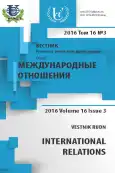Military Exercises and the Dangers of Misunderstandings: the East-West Crisis of the Early 1980s
- Autores: Heuser B1
-
Afiliações:
- Reading University
- Edição: Volume 16, Nº 3 (2016): International Conflicts: Quo Vadis?
- Páginas: 391-404
- Seção: ARTICLES
- URL: https://journals.rcsi.science/2313-0660/article/view/339006
- ID: 339006
Citar
Texto integral
Resumo
This article analyzes the risks of mutual misunderstanding caused by NATO and the Warsaw Treaty Organization (WTO) large-scale military command-and-staff exercises in 1983. The problem of mutual misunderstanding is analyzed in the context of the classic «Security Dilemma» elaborated in 1951 by J. Gertz and adapted to military exercise issues by D. Adamski. In spite of all the available knowledge, analysis, intelligence and other forms of communication between the West and the East, a problem of mutual misunderstanding appeared between two blocs. This was highlighted during the command and staff exercises of the NATO countries «Able Archer 83» when the world was put on the brink of nuclear war. Given that the Western countries have considered exercises as a deterrence of possible attack by the WTO, the Eastern Bloc countries considered such activities directly threatening their military security. According to the author, these were military exercise carried out by both sides, which represented the most important factor of the sharp deterioration in relations between the West and the East in the early 1980s following the period of détente in the 1970s. The article is based on a large empirical data, archives data, personal interviews by the author of the participants of these events.
Palavras-chave
Sobre autores
B Heuser
Reading University
Autor responsável pela correspondência
Email: ee@yr.ru
Reading, United Kingdom
Bibliografia
- Adamsky, D. (2013). The 1983 Nuclear Crisis – Lessons for Deterrence Theory and Practice. Journal of Strategic Studies, 36 (01), pp. 4-41.
- The Crisis of Détente in Europe: From Helsinki to Gorbachev, 1975-1985 (2008). Ed. by Nuti L. London: Routledge.
- DiCicco, J. (2011). Fear, Loathing, and Cracks in Reagan’s Mirror Images: Able Archer 83 and an American First Step toward Rapprochement in the Cold War. Foreign Policy Analysis, 7, pp. 253–274.
- Fischer, B. (1999). The 1980s Soviet War Scare: New Evidence from East German Archives. Intelligence and National Security, 14 (03), pp.186–197.
- Schaefer, B., Jones, N., Fischer, B. (2014). Forecasting Nuclear War: Stasi/KGB Intelligence Cooperation under Project RYaN. The Nuclear Proliferation International History Project, Wilson Center. URL: https://www.wilsoncenter.org/publication/forecasting-nuclear-war (accessed: 15.08.2016).
- Fischer, B. (1997). The Reagan Reversal of Foreign Policy and the End of the Cold War. Columbia: University of Missouri Press, 1997.
- Hersh, S. (1986). The Target is Destroyed’: What Really Happened to Flight 007 and What America Knew About It. N.Y.: Random House, 1986.
- Herz, J. (1950). Idealist Internationalism and the Security Dilemma. World Politics. 2 (02). pp.157.
- Heuser, B. (2008). The Soviet response to the Euromissile crisis, 1982-83 in The Crisis of Détente in Europe: From Helsinki to Gorbachev, 1975-1985. Ed. by Nuti L. London: Routledge. pp. 137-149.
- Oberdorfer, D. (1991). The Turn: from the Cold War to a New Era – the US and the Soviet Union, 1983-1990. N.Y.: Poseidon Press.
- Ploetz, M. (2004). Ferngelenkte Friedensbewegung? DDR und UdSSR im Kampf gegen den NATO-Doppelbeschluss. Münster: LIT-Verlag.
- Prados, J. (2005). The War Scare of 1983 in The Cold War: A Military History. Ed. by Cowley R. N.Y.: Random House. pp. 438-454.
- Sabin, P. (1986). The Third World War Scare in Britain: A Critical Analysis. Basingstoke: Macmillan.
- Scott, L. (2011). Intelligence and the Risk of Nuclear War: Able Archer-83 Revisited. Intelligence and National Security. 26 (06). pp. 759–777.
- The Soviet "War Scare." (1990). The President’s Foreign Intelligence Advisory Board. 15 February 1990. George H.W. Bush Presidential Library. URL: http://nsarchive.gwu.edu/nukevault/ebb533-The-Able-Archer-War-Scare-Declassified-PFIAB-Report-Released/ (accessed: 15.08.2016).
- Tague, E. (1984). Soviet War Propaganda Generates Fear among the Population. Radio Free Europe/Radio Liberty Research Paper 61/84. 6 February 1984.
- Vincent, P. (1999). War Scare: Russia and America on the Nuclear Brink. Westport: Ct.: Praeger.
- Voß, K. (2014/2015). Die Enden derParabel Die Nuklearwaffenübung «Able Archer» im Krisenjahr 1983’. Special Issue of Mittelweg. 36. P. 73-92.
- Watt, D.C. (1983). What about the People? Abstraction and Reality in History and the Social Sciences: an Inaugural Lecture. London: London School of Economics.
- War plans and alliances in the Cold War: threat perceptions in the East and West. (2006). Ed. by Mastny V., Holtsmark S., Wenger A. London: Routledge.
Arquivos suplementares









